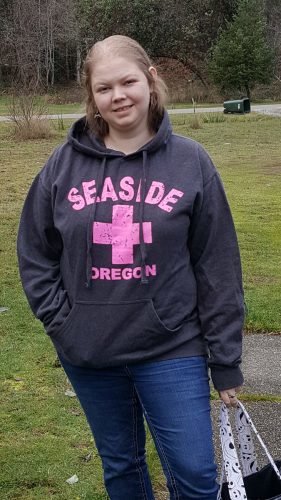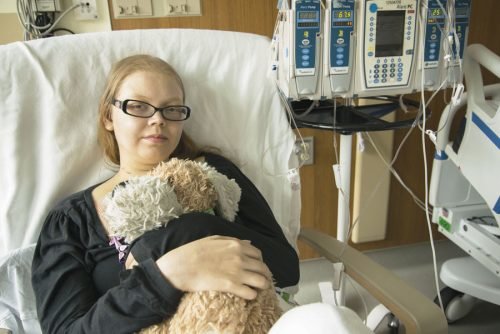 Oberts enjoys being back home on the peninsula with her family. Photo courtesy: Cathy Oberts
Oberts enjoys being back home on the peninsula with her family. Photo courtesy: Cathy Oberts
Savana Oberts, 27, who became the first adult in the Pacific Northwest to receive a liver/pancreas/small intestine transplant in August 2016, is now almost fully recovered. She will complete her degree in education soon and hopes to student- teach next fall.
Although the last year has had its challenges, Oberts has no regrets. “Would I want to do it again?” she said. “No. It is the hardest thing I have ever done. But when I look at life before and after the transplant, there is no comparison.”
Oberts was born with malrotation of the intestine, a congenital condition in which the intestine is not well affixed within the abdomen, so at any point it can twist and cut off its own blood supply. She had no symptoms until she was in college, when her small intestine became twisted and was removed during an emergency surgery. Although the surgery was life-saving, it also meant that Oberts was not able to absorb any nutrition by eating. She depended on intravenous nutrition delivered directly into her blood stream.
The intravenous nutrition led to liver damage. Oberts’ only long-term chance for survival was a transplant (“Savana Oberts, Pioneer,” KP News, Sept. 2016). She remembers waking up, still on a ventilator after the surgery, and writing a question on her mom’s palm, “Did it work?”
“I cried when she answered, ‘Yes,’” Oberts said.
Her recovery had its ups and downs. She spent a long time in the hospital before the transplant and her postoperative recovery took nearly two months. Oberts was diagnosed with mild depression and said that the time was stressful. “I got really, really sick of doctors,” she said.
Then, less than a month after she went home, Oberts was readmitted for signs of rejection of her new organs. “It happens to just about everyone who has had a transplant,” she said. “I was treated with massive steroids and was in the hospital for over a month. It was scary.”
She was in and out with other complications for a few weeks at a time, but she went home for good Dec. 21.
Oberts said she continues to get stronger day by day. When she first went home, she was so deconditioned by her long hospitalization, she couldn’t stand up for 10 minutes. She worked with physical therapists for six months to regain strength. Now her main complaint is that she has overdone some activities, leading to some knee and ankle sprains.
Oberts will be on medications to prevent her body from rejecting her new organs for the rest of her life, and because they suppress the immune system, they may increase her risk of infection. She’s on fewer drugs now than when she first went home, but still takes five pills every morning and five in the afternoon. She needs blood tests every two weeks for now, and she sees her medical team every three months.
She’s eating just about everything (pomegranates, grapefruit and alcohol are forbidden because they interact with her medications), but must ensure meat and eggs are fully cooked and fruits and vegetables are washed. And she’s not allowed to eat at buffets or potlucks.
Oberts has continued her education online through Western Governor’s University. She knew she couldn’t carry a full load after she first got sick, but continued to take courses and will be ready to student-teach next fall. She’s working as a substitute paraeducator now. When asked about her risk of infections when working with children, she said, “I just need to be a bit more careful. I’ll get my flu shot each year and keep my classroom clean.”
 Oberts recovering from surgery in Sept. 2016. Photo courtesy: UW Medical Center
Oberts recovering from surgery in Sept. 2016. Photo courtesy: UW Medical Center
Triple Organ Transplant Makes History
(Excerpted from Oct. 2016 issue, KP News)
In 2011, when Savana was a junior at Western Washington State University, an undetected birth defect caused a sudden, painful kink in her small intestine, cutting off its blood supply. The intestine was removed and although the surgery saved her life, Savana could no longer absorb any nutrition by eating. She had to depend on nutrient and calorie-rich fluid delivered directly into her blood stream.
That technology kept Savana alive but tethered to an IV—a situation fraught with medical complications. The intravenous nutrition led to liver damage. Her only long-term chance for survival was a liver and small intestine transplant.
Savana’s medical team, led by Dr. Jorge Reyes, UW chief of transplant surgery, had her undergo preoperative testing, confirmed her fluid balance was good and performed critical tests to match donor tissue. When a donor was found, Dr. Reyes went to Harborview Medical Center to harvest the organs, and Savana was taken to the operating room at UW to be prepped and wait for the next news: Would the donated organs be viable?
Dr. Reyes removed the liver, pancreas and small intestine from the donor. They were healthy. Although Savana did not need a pancreas, the three organs are so closely interconnected with blood supply and drainage systems, they came as a unit. Savana’s damaged organs were removed and replaced with the donor’s organs after a four-hour surgery.
Her mother, Cathy, expressed deep gratitude to the Key Peninsula community. Multiple local fundraisers have provided help both with Savana’s uncovered medical expenses and assistance as her family stayed with her in Seattle. “We would like to thank the community for the generosity and support during this time. It means the world to us,” she said.
UNDERWRITTEN BY THE FUND FOR NONPROFIT NEWS (NEWSMATCH) AT THE MIAMI FOUNDATION, THE ANGEL GUILD, ADVERTISERS, DONORS AND PEOPLE WHO SUPPORT INDEPENDENT, NONPROFIT LOCAL NEWS